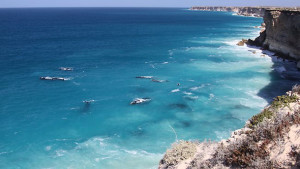 Two of Australia’s most iconic marine national treasures are under threat from climate change and fossil fuel extraction.
Two of Australia’s most iconic marine national treasures are under threat from climate change and fossil fuel extraction.
As I blogged earlier this month, an imminent tragedy is unfurling on the Great Barrier Reef caused by coral bleaching caused by climate change exacerbated by an unusually strong El Nino.
The situation is getting worse by the day.
Yesterday, the Great Barrier Reef Marine Park Authority raised the threat level of coral bleaching to its highest level of response to “severe regional bleaching” in the northernmost quarter.
The Authority’s chairman, Russell Reichelt, said corals in far north of the reef, which have endured surface temperatures of 33 degrees for months, were “effectively bathed in warm water for months, creating heat stress that they could no longer cope with”.
Queensland Greens senator Larissa Waters has now called on Australia’s political parties to “break their addiction with fossil fuels and dirty donations in order to save the Great Barrier Reef and our very way of life.”
There is a perfect test case as to whether Australia will break its fossil fuel addiction. As the Great Barrier Reef suffers, oil giant BP is determined to put at risk another of Australia’s last great wilderness areas.
Despite the Great Australian Bight being a haven for several important species of whales, as well as sea lions and great white sharks, it is seen by the oil industry as a potentially huge new frontier, with a similar geology to the Niger and Mississippi Deltas.
Last November, in a major set-back for the oil giant, BP’s highly controversial drilling was rejected for falling short of environmental standards.
Now undeterred, the oil giant has resubmitted plans to the regulator, the National Offshore Petroleum Safety and Environmental Management Authority (NOPSEMA).
A decision is expected by the middle of next month.
The company wants to start drilling in the summer of 2016–2017, with each well taking between 45 and 170 days to complete.
BP faces stiff opposition from local environmental groups: Wilderness Society South Australia director Peter Owen arhues “BP must not be allowed to risk the pristine marine wilderness of the Great Australian Bight whale nursery — our tourism, fishing and coastal communities.”
Owen adds “Pushing to expand the fossil fuel industry is the height of irresponsibility. We must rapidly transition out of fossil fuels to have any chance of providing our children with a liveable climate.”
The Wilderness Society believes that any spill in the region could be far worse than in the Gulf of Mexico due to the region’s remoteness, rough seas and strong currents.
And now the Society is calling on Australia to rule out oil exploration and development in Bight after the US announced a five-year ban on offshore drilling in much of the Atlantic last week.
The Society’s National Director, Lyndon Schneiders, waded into the debate by arguing that: “If Australia is going to keep its commitment it made in Paris to try to keep global temperature rise to below 1.5 degrees Celsius, then we cannot be opening up new fossil fuel precincts.”
So its simple, Australia could help save the Reef by banning drilling on the Bight. But will it?

I want to be able to take my grandkids down the beach, to safely swim, with no oil spills or clean_up chemicals in the water, to learn about the aquatic wildlife, to safely eat fish. Its that simple. Life versus not life.
Well said Barbra!!! I don’t even know if I want to have children with this sort of stuff happening!